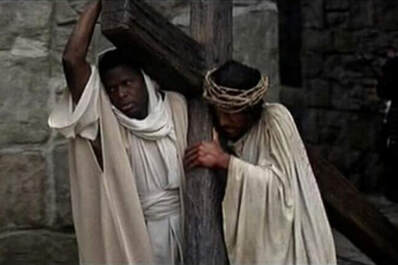As we follow the steps of Christ on his way to Golgotha, we meet Simon of Cyrene, who reminds us that no-one is an extra in this drama of life. As we walk with Jesus, we are changed forever.
Matthew 27:31-33 ESV And when they had mocked him, they stripped him of the robe and put his own clothes on him and led him away to crucify him. As they went out, they found a man of Cyrene, Simon by name. They compelled this man to carry his cross. And when they came to a place called Golgotha (which means Place of a Skull),
Who was Simon of Cyrene?
Simon’s inconvenient “chance” encounter changed his destiny, his family, and Africa’s involvement in the cross.
Simon of Cyrene is mentioned in three of the four Gospels as the man forced by the Roman soldiers to carry Jesus’ cross out of Jerusalem. His country of Cyrene has led many to wonder if he was of African descent (and therefore black), or if he was simply born there as were many others of Greek, Roman, and Jewish descent.
Cyrene was situated in modern-day Libya, on the northern coast of the African continent. It was settled by the Greeks in 630 B.C. and later filled with a significant Jewish population. Cyrene was the capital of the Roman district of Cyrenaica at the time of Jesus’ crucifixion. At that time Cyrene was home to a large number of Greek-speaking, or Hellenistic, Jews.
Many Jews from Cyrene had returned to Israel and were part of a community in Jerusalem called the Synagogue of the Freedmen. The Synagogue of the Freedmen included Jews from many other provinces including Alexandria (Egypt), Cilicia and Asia.
Acts 6:9 ESV Then of those who belonged to the synagogue of the Freedmen (as it was called), and of the Cyrenians, and of the Alexandrians, and of those from Cilicia and Asia, rose up and disputed with Stephen.
Men from Cyrene were among those converted at Pentecost.
Acts 2:7-12 ESV And they were amazed and astonished, saying, “Are not all these who are speaking Galileans? And how is it that we hear, each of us in his own native language? Parthians and Medes and Elamites and residents of Mesopotamia, Judea and Cappadocia, Pontus and Asia, Phrygia and Pamphylia, Egypt and the parts of Libya belonging to Cyrene, and visitors from Rome, both Jews and proselytes, Cretans and Arabians—we hear them telling in our own tongues the mighty works of God.” And all were amazed and perplexed, saying to one another, “What does this mean?”
Believers from Cyrene were among the first to be scattered by the persecution in Jerusalem went to Antioch and were instrumental in the formation of the church there where, for the first time, “the disciples were called Christians”
Simon of Cyrene is mentioned in Matthew, Mark and Luke. Matthew only records his name and country,
Matthew 27:32 ESV As they went out, they found a man of Cyrene, Simon by name. They compelled this man to carry his cross.
Mark and Luke say that he was “on his way in from the country” but Mark also added that he was “the father of Alexander and Rufus”, men obviously well known to Mark’s readers.
Luke 23:26 ESV And as they led him away, they seized one Simon of Cyrene, who was coming in from the country, and laid on him the cross, to carry it behind Jesus.
Mark 15:21 ESV And they compelled a passerby, Simon of Cyrene, who was coming in from the country, the father of Alexander and Rufus, to carry his cross.
It is speculated that the Rufus mentioned here may be the same man Paul greets in his letter to Rome.
Romans 16:13 ESV Greet Rufus, chosen in the Lord; also his mother, who has been a mother to me as well.
So does any of this indicate that Simon was black? We don’t know for sure but it is certainly possible that Simon was an African who converted to Judaism. It is also very likely Simon’s encounter with Jesus changed his life for ever. He witnessed the terrible suffering of Jesus first hand, and that may be what drew Simon to Christ. Because of this, it would seem that Simon became a follower of Jesus as did members of his family.
Many in Africa and those of African decent, most especially those in the United States, have experienced horrendous suffering themselves. When we suffer unjustly at the hands of cruel people, we can trust God to use these circumstances to draw people to himself, as he did with Simon.
NOTE: All emphasis in Scriptures mine.

 RSS Feed
RSS Feed